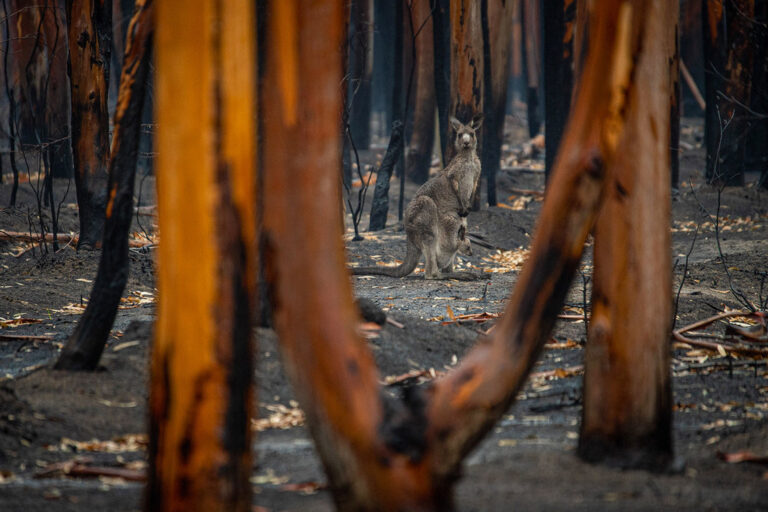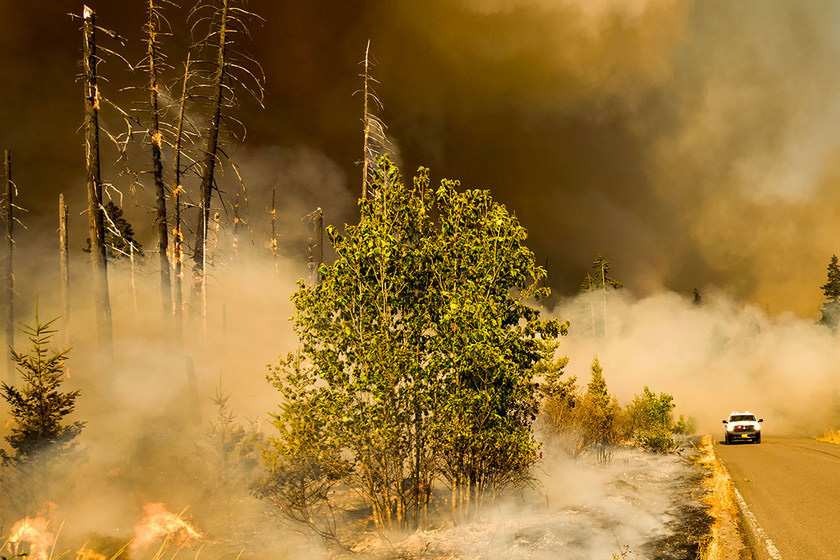Human beings have warmed the planet to a level never seen in the last 2000 years
The activities carried out by human beings in the last two centuries have warmed the planet to a level never before seen in the last 2000 years.
All scientists agree that the climate is changing in all corners of the planet on an unprecedented scale. Some of those changes will be irreversible for thousands and hundreds of thousands of years. Only strong and lasting action to reduce greenhouse gases can limit its scope.
A new report by the Intergovernmental Panel on Climate Change shows that greenhouse gas emissions from human activities are responsible for a global warming of 33.98°F from the period 1850-1900 to the present.
More alarming is the fact that the study predicts that global temperatures are expected to reach or exceed 34.7°F or more warming in the next 20 years.
This assessment is based on data sets collected by all the world’s climate scientists.
They are all unanimous in observing that the climate is changing in all corners of the planet on a scale not seen in thousands and even hundreds of thousands of years. And they agree that some of those changes underway will be irreversible for thousands and even hundreds of thousands of years.
There is still time to minimize the impact
But everyone also agrees that “a strong and lasting reduction in emissions of carbon dioxide and other greenhouse gases can limit the magnitude of climate change.”
By scientists’ calculations, those reductions can quickly pay off for air quality, but it can take 20-30 years for Earth’s temperatures to stabilize.
The report Climate Change: the scientific bases was approved last Friday by the 195 governments that are part of the aforementioned Group, and it is the first installment of the six that will be published until 2022.
“The report reflects an extraordinary effort under exceptional circumstances,” said Hoesung Lee, Chairman of the Intergovernmental Group. “The findings of this report and the advances it reflects on climate science provide an invaluable contribution to climate-related negotiations and decision-making.”
But not much and then it can’t be reversed

The forest fires in Australia are yet another sign of the advance of climate change. Photo: Jo-Anne McArthur/Unsplash
One of the novelties of the document is the new estimates on the probabilities that exist of crossing the level of 34.7 degrees of warming in the next decades and reveals that, unless there is an immediate large-scale reduction of greenhouse gas emissions, limiting the rise in the average temperature of the Earth to that barrier or even to that of 35.6°F will be impossible to achieve.
These predictions are based on an improvement in the observation of the data that serve to evaluate historical global warming, as well as an advance in the scientific understanding of the response of the climate system to the emissions of gases emitted by human activity.
“This report is a reality check,” says Co-Chair of the IPCC Working Group Valérie Masson-Delmotte. “We now have a better picture of the past, present and future of the climate, which is essential to understand where we are going, what can be done and how to prepare.”
Code red for humanity
After the report was released, the UN Secretary General said that it was nothing less than “a red code for humanity. The warning signs are deafening and the evidence is irrefutable“.
António Guterres noted that the internationally agreed global warming threshold of 34.7 degrees above pre-industrial levels was “dangerously close.” We run the imminent risk of reaching 34.7 degrees in the short term. The only way to prevent this threshold from being exceeded is to urgently redouble our efforts and pursue the most ambitious path.
“We must act decisively now, to keep the 34.7 degree threshold alive.”
The UN head explained that the solutions are clear: “Inclusive and green economies, prosperity and cleaner air, along with better health, are possible for all, if we respond to this crisis with solidarity and courage,” he said.
He added that ahead of the crucial COP26 climate conference, to be held in Glasgow in November, all nations – especially the advanced economies of the G20 – must join the net zero emissions coalition, and reinforce their promises to curb and reverse the global warming, with credible, concrete and improved plans ”that establish detailed measures in the so-called National Determined Contributions.
Every corner of the planet faces changes
Many of the characteristics of the climate, the report explains, depend directly on the level of global warming, but what people and regions experience is very different from that average. For example, the warming of the Earth’s surface is greater than the average of the planet and in the Arctic it is up to two times greater.
“Climate change is affecting every corner of the planet in multiple ways. The changes we experience will increase with increasing warming, ”said Panmao Zhai, the other co-chair of the IPCC Working Group.
The report projects that changes in climate will increase in all regions in the coming decades.
Thus, with an increase of 34.7 °F, there will be more heat waves, the hot seasons will be longer and the cold ones shorter. And with an increase of 36.5 °F, extreme heat events will be more frequent and will reach critical tolerance levels for health and agriculture.
But it is not just a matter of temperature. Climate change will bring many different changes in different places, which will increase with further warming. This includes changes in humidity and dryness, in winds, snow and ice, and in coastal areas.
The floods of the century will be the floods of the year

Imagen de un parque eólico en Biedesheim, Alemania. Foto: Karsten Würth/Unsplash
Among such changes, the report highlights:
- Intensification of the water cycle. This means heavier rains, more stubborn floods and droughts.
- Change in rain patterns. At high latitudes, precipitation is likely to increase, while it is projected to decrease in the subtropics. Monsoon precipitation will vary, being different in each region.
- Coastal areas will see sea level rise continue throughout the 21st century, contributing to greater flooding in lower areas and greater erosion. Coastal extreme events that previously occurred every hundred years will now be recorded every year.
- Further warming will amplify the melting of the permafrost layer and the loss of seasonal snow, as well as the melting of glaciers and the loss of the Arctic layer during the summer.
- Changes in the ocean will lead to warming with increased marine heat waves, continued acidification of the water, reduced oxygen levels. Such changes, which will continue throughout the century, will affect both marine ecosystems and people’s ability to trust them.
- In cities, some aspects of climate change will be increased, such as increased heat (urban areas are already warmer than their surroundings, the frequency of flooding due to rains and rising sea levels in the cities). coastal cities.
For the first time, this six-part report provides a more detailed regional assessment of climate change, including useful information for risk impacts, adaptation and decision-making. It also provides a new framework that helps translate the physical changes that climate change will bring about – heat, cold, rain, snow, drought, wind, coastal flooding, and more – into their impact on societies. and ecosystems.
Regional information can be explored in detail in the new Interactive Atlas developed by the Intergovernmental Group, as well as on the regional pages dedicated to respect in the report.
The influence of human activity on the past and future of the climate

Supercell clouds over Burling in the US state of Colorado. Photo: Guillaume Hobam/WMO
“It has been clear for decades that the Earth’s climate was changing and that the role of human influence on climate systems is indisputable, Masson-Delmotte said.
However, the new report also reflects important advances in the science of attribution – that is, understanding the role of climate change in intensifying weather and climate events, such as extreme heat waves and torrential rains.
The scientists who have participated in the writing of the report have also wanted to show how human action still has the potential to determine the future of the climate.
There is clear evidence that carbon dioxide is the main agent of climate change, even though other greenhouse gases and air pollutants also affect the climate.
“Stabilizing the climate will require strong, rapid and sustained reductions in greenhouse gas emissions and reaching zero net CO2 emissions. Limiting other greenhouse gases and air pollutants, especially methane, could be beneficial for both health and climate, ”Zhai concluded.
About the Intergovernmental Group
The Intergovernmental Panel on Climate Change (IPCC) is the main international body for assessing climate change. It was created by the United Nations Environment Program (UNEP) and the World Meteorological Organization (WMO) in 1988 to provide the world with a clear scientific view of the current state of knowledge on climate change and its potential environmental impacts and socioeconomic. In the same year, the United Nations General Assembly endorsed the decision of WMO and UNEP to jointly create the IPCC.
The IPCC is a scientific body. Examines and evaluates the most recent scientific, technical and socio-economic literature produced around the world relevant to understanding climate change. It does not conduct any research or monitor weather data or parameters.
The IPCC is an intergovernmental body. All member countries of the United Nations and WMO can join it. Currently 195 countries are members of the IPCC. The Intergovernmental Group of Experts meets at least once a year in plenary session at the level of government representatives where the main decisions on the IPCC work program are made and the members of the Bureau are elected, including President. Governments are also involved in exploring the scope of reports, naming authors and the review process, and accepting, adopting and approving reports in plenary sessions.
Because of its scientific and intergovernmental nature, the IPCC embodies a unique opportunity to provide balanced and rigorous scientific information to decision makers. By endorsing the IPCC reports, governments acknowledge the authority of their scientific content. Thus, the work of the organization is relevant to policy-making, yet neutral, never prescriptive.
Esta nota fue publicada por UN News
